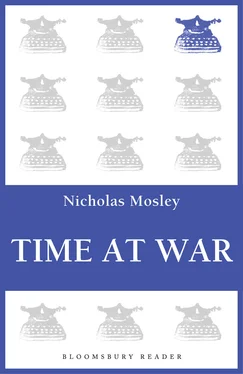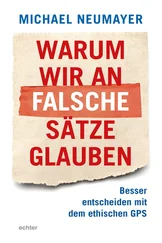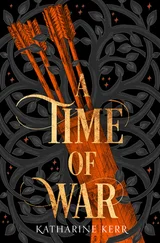The authorities declared I was eligible for Burma by just three weeks, and nothing that any kindly CO or brigadier out here can do can stop me. But as it happened I received the news with something like relief, and would not now alter the arrangement even if it were possible. I have been growing moribund in Austria with the harassing job of organising sports from the confines of a stuffy office. Leave, I am sure, will miraculously revive me.
I don’t know how much this was bravado: it was perhaps a fatalism I had learned; and there might be a way of going east with my old clique of friends. So off I went from Austria on the long and by now familiar journey back through Florence and Rome to Naples to wait for a boat to take me home, if only en route to tortuous approaches to Japan. I was sitting with a few fellow travelling companions on the terrace of the Officers’ Club looking out across the beautiful bay at Vesuvius, which was smoking rather ominously in the distance (it had caused some consternation by half erupting the previous year: this was August 1945), and I was thinking that after all on no account did I want to go to fight Japan. Then we read in the local army newspaper that a bomb had been dropped on Japan that was a new sort of bomb — something to do with what goes on at the heart of the matter — and its effects were so horrific that countless thousands of people had been killed and the Japanese were already talking of surrender. In fact, its effects were so unknown and so uncanny that in future large-scale wars might be made impossible. So I thought — Well that’s not so bad then! Good old whatever-it-is at the heart of matter!
Humans seem at home in war. They feel lost when among the responsibilities of peace. In war they are told what to do: they accept that they have to ‘get on with it’ In peace it seems uncertain what they have to do: they have to discover what the ‘it’ is to get on with.
I had been keen to get home to be with my family and friends, even if it was only for a month before going out to Burma or wherever. But if the war was really about to be over, then it might be possible that I could be at peace in the Far East with my so-called clique of friends. This clique I had fantasised about in Italy was a sort of alternative family, to be enjoyed if possible in conjunction with both my father’s and my sister’s establishments. At school my friends and I had been, yes, in our attitudes homosexual; though only in one pairing occasionally practising. For the most part we were fantasy-gay in style, in conceits. In war this style had had to be carried on mainly by letter. But as part of occupying forces in Burma, Malaysia, might not three or four of us form an exotic home from home?
When I had gone from public school straight into the army this had seemed to be a continuation of a homosexual world in which there were no natural family ties — no responsibilities, no chance of children. In this sense it had been like the Garden of Eden. Would it be possible to create a peacetime Eden?
In the army in Italy I had hardly thought of myself as homosexual: I had scarcely felt myself sexual at all — sex was an itch that war had pushed into the sidelines. Then, when I had been in Naples with Anthony (with whom my friendship was strictly platonic) I had written to a third member of the clique who was recovering from D-Day wounds in England — ‘Anthony keeps talking paternally of the ultimate necessity of marriage and family-rearing which, he maintains, involves SETTLING DOWN at some quite early date. I do not grant him this last proposition, for I hold that it is just as preferable to be UNSETTLED in marriage as it is out of marriage.’ And then — ‘I WILL NOT BE RESPECTABLE.’ And earlier — ‘I am both ignorant and disinterested in women.’
But then, when I got home to London in September 1945, I found that the whole grandiose social whirl had started up again as if there had been only a blip since September 1939. Almost every night there were what used to be known as debutante dances, to which those thought to be socially acceptable were invited and to which I had the entrée through my sister Vivien and my Aunt Irene Ravensdale. And each of these dances seemed to consist of an enchanted garden of girls. How was it possible that I had not noticed girls before? Now, suddenly, they seemed to be everywhere and infinitely alluring; as thick on the ground as — how might it be put? — ‘autumnal leaves that strew the brooks in Vallombrosa’? But had not this been Milton’s reference to fallen angels? Well, so be it. If it was love that one wanted — take one’s pick!
But here was a problem: how on earth did one pick and choose? In a heterosexual world it seemed that one was expected to fall in love with just one girl, but surely with such profusion one wanted the whole lot — or at least a big bunch, an armful. But this was held to be not acceptable.
Such were the dilemmas when one was over the edge into peace. I learned that two of my old school friends were settling in to the Far East. But now, surely, it would be more pleasant and even vital for me to stay in London and explore the peacetime possibilities, however baffling, of getting to grips with women.
But with my orders to embark for Malaysia having come through, how would this be possible? After such homosexual affectations, in the heterosexual world had my luck run out?
Then, at one of these dances — at the Savoy Hotel, I think — I had retired to the bar in some exhaustion from trying to squeeze what dalliance I could into what time I had left, and there I came across a major whom I knew slightly, or perhaps he was a friend of my sister’s; and he asked me what I was doing nowadays; and I said I was just off to the Far East. And he said — ‘My dear fellow, why on earth do you want to do that?’ And I said — ‘I don’t.’ So he said — ‘Come and see me in the War Office in the morning.’ So I did, and I did not know if he would even remember me. But there he was, behind a desk even if somewhat holding his head; and he said — ‘I’m afraid I can’t quite manage the War Office, but would a job in Eastern Command, Hounslow do?’ And I said — ‘Indeed, thank you, Eastern Command, Hounslow would do very well.’ So in a day or two I received papers taking me off the draft to the Far East and instructing me to report to Hounslow Barracks — a gaunt building like a furniture depository some ten miles west of London. There, no one was expecting me, but I was given a desk and a chair, where I sat and wondered once more in what style I would one day be able to try to write about war — its luck that seemed to take the place of conventional responsibility. At intervals I played ping-pong with the man with whom I shared an office, using our desks pushed together as a table and copies of The Manual of Military Law as bats. Eventually work was found for me, which was to do with officers’ pay and courts martial — the latter often dealing with officers caught and photographed as transvestites. And in the evening I would catch the District Line back to London, where I continued to learn the pleasure of prowling in search of — yes, this was surely a better way of putting it — the rose among the rosebud garden of girls.
So this was peace? But there remained the problem of how to make sense of responsibility.
When people said at the end of the war that they found themselves at a loss — they could no longer feel that that they just had to ‘get on with it’ but now had to find the ‘it’ that they had to get on with — was this ‘it’ really just the evolutionary business of finding a mate, settling down, procreation? But humans had always found confusion with this; was it not a sort of war? But in so-called ‘peace’ there were no longer orders coming down from on high; or if religion or social custom claimed that there were, then it was still up to the judgement of individuals to respect these or reject them. Humans had to make their own dispositions to deal with the ‘its’ that they were finding they had to get on with — work, faith, relationship. And regarding these they felt not only at a loss, but that such a feeling was somehow reprehensible — for should not at least love, the commitment to love, the care of children (so they had an instinct to believe) be sweetness and light? And if it was not, should there really be only themselves to blame? Humans were thrown into the deep end of peace and had to learn how to swim. But why had it ever been thought that peace should be easy? If peace involved the requirement to take responsibility for oneself, then all right, yes, it could be seen how obedience in war might be easier.
Читать дальше












